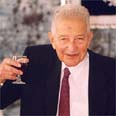
Ezer Weizman to be laid to rest
President Ezer Weizman, who died at age 80, to be honoured by thousands of Israelis on Tuesday at state memorial ceremony in Or Akiva; Former airforce commander was among Israel's top brass and one of the country's most outspoken leaders
OR AKIVA - Thousands of Israelis are expected to gather on Tuesday at 5 p.m. (10 a.m. EST) to pay their last respects to former President Ezer Weizman, who died on Sunday at age 81, in a state memorial ceremony.
Weizman had been hospitalized several times recently as a result of his deteriorating health, but his relatives said he did not suffer in his last days. Since his death, accolades have poured in for the former president, Air Force commander, politician and ultimate representative of the renewed Israeli Zionism.
Weizman rejected offers to be buried alongside Israel’s top brass in Mount Herzl and instead wished to be laid to rest in the northern town of Or Akiva near his son and daughter-in-law, who were killed in a car
accident in 1991.
Weizman, Israel's 7th president, was known as one of Israel's most impressive and colorful leaders and never hesitated to speak his mind.
Sharon: I lost a commander and close friend
In reaction to the news of Weizman's death, Prime Minister Ariel Sharon said he lost a commander and close friend.
"Ezer distinguished himself with his determination, leadership, bravery, and sharpness of tongue," the prime minister said.
Vice Premier Shimon Peres said Weizman "displayed both military and civilian courage and as he fought bravely for Israel's security, so he fought boldly for peace. Ezer became a legend while still alive and will remain so in our memory."
See exclusive video of milestones in Weizman's life.
Egyptian President Hosni Mubarak phoned Weizman's widow, Reuma, Monday to offer his condolences and apologize for not being able to attend Tuesday's funeral.
Meanwhile, Egyptian Ambassador to Israel Mohammad Assem Ibrahim told Ynetnews he met Weizman for the first time about 25 years ago and found him to be a "special" statesman.
The ambassador added he did not get to meet Weizman while still alive and accord him the proper respect, but pledged to be among the first to honor him Tuesday. Weizman was a well-known figure in Egypt, Ibrahim said.
"We knew him particularly as a man of peace who acts for the security of Israel," he said. "Weizman enjoyed great respect and had many friends in Egypt."
Born in Tel Aviv
The former president was born on June 15, 1924 in Tel Aviv and grew up in Haifa. He came from an aristocratic Israeli family and was the nephew of the country's first President Chaim Weizmann and the brother-in-law of noted Israeli warrior and politician Moshe Dayan.
In World War II, Weizman served as a pilot in the British Air Force and later joined the Irgun underground organization, which fought against the British rule in the Land of Israel. He was among the Israeli Air Force's pioneers and headed it in 1958-1966.
In 1977, he was elected to the 9th Knesset and appointed as Defense Minister in former Prime Minister Menachem Begin's first Likud -led government.
However, starting in 1978, Weizman's political views began to change.
He rejected the "Greater Israel" doctrine he previously supported, and called for advancing peace talks with Egypt. Later, he became one of the architects of the peace agreement with Israel's southern neighbor.
Moved to Labor party
In 1980, Weizman left the government following disagreements with Begin. Several months later, Weizman voted against the government in the Knesset and was kicked out of the right-wing Herut movement.
Weizman later established his own party, "Yachad," but eventually joined the Labor party . There, too, he was known as a dove and pushed for direct negotiations with Yasser Arafat's Palestine Liberation Organization.
The former president was elected to the 12th Knesset and became the Minister of Science and Technology. At the end of 1989, he was dismissed from the cabinet for a year and a half following a crisis with Likud Prime Minister Yitzhak Shamir over the question of negotiations with the PLO.
Weizman later quit the Knesset in light of the intention to nominate him as a presidential candidate. In March of 1993 he was elected as President, and in 1998 was chosen for a second term.
Outspoken president
During his tenure as president, Weizman often publicly expressed his opinions on various matters and found himself embroiled in public controversy on more than one occasion.
In various junctions he advised the government how to act and on some occasions made anti-feminist and homophobic remarks.
On the other hand, he enjoyed great popularity among the public in light of his colorful character and the attention he devoted to wounded IDF soldiers and bereaved families.
In 1999, after journalists exposed a secret loan he received, calls for Weizman's resignation mounted. Although the investigation against him was closed, Weizman later announced he would quit and in July 2000 become the first Israeli president to ever resign.
Prior to the funeral, Weizman’s coffin is set to be laid in state at the Or Akiva cultural center for those who wish to pay their last respects.










